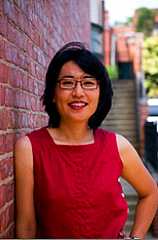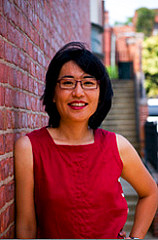Mari Kuraishi says that being a TCK gave her instant credibility when she began her career as a country officer for the World Bank. As a TCK who grew up in Japan, Europe and the United States, Kuraishi, 44, turned to nonprofit work in 1997 when she co-founded GlobalGiving, an online marketplace that connects philanthropic donors with people in developing countries around the world. During Kuraishi’s tenure as president and co-founder, GlobalGiving has been featured in the New York Times, CNN and NPR.
1. You grew up internationally – what’s the story?
My dad used to work for Shiseido, the Japanese cosmetics company. He was part of the team that turned Shiseido into an international brand. We ended up in Los Angeles, Milan, Germany and Japan.
2. How did you get to where you are now?
Through a series of accidental choices. I ended up studying Russian history at Harvard. I picked up Russian, did a master’s in Sovietology and a PhD program. Then, in the middle of my program, the Soviet Union fell apart. I joined the World Bank and became a country officer for Russia where I looked at the broader economic development industry.
3. What got you into Sovietology?
When I was growing up in Germany, the country was still divided. On the Western side of the Berlin Wall where I lived, there were all these stands by the wall, and you could see all these high school kids getting up on these stands to look over it. But the people on the other side wouldn’t even look. The Eastern Germans trained themselves to not look, even though it’s instinctual to look. I felt I needed to understand that.
4. What is your role at GlobalGiving?
Our organization is relatively flat, but it needs to deliver impact and be financially well managed. I’m involved with raising funds, because we’re not fully self-sufficient yet, and serving as spokesperson for GlobalGiving.
5. What were some lessons you learned during your first years building GlobalGiving?
Building something from scratch takes longer than anyone expects. What you think it’s going to take — double it. If people had any idea of how long it takes, no one would start it. It was a lesson in knowing you have to balance irrational expectations with an ability to take the reality of what was going on and roll with it. But I had stubborn persistence: I thought, “I still think it can be done.”
It’s also extremely nerve wracking when you find yourself in a situation where you have to make payroll for people, and you don’t know where that payroll is going to come from. It challenges your willingness to embrace risks and potentially let people down.
6. You manage a team of five people. What’s that like?
I’m one of those people who is much harder on themselves, so I suspect I require high standards of others as well. When you’re hard on yourself, what you’re demanding of someone else may or may not be reasonable. So what you’re good at isn’t what they’re good at, but they may be good at something you’re not.
It’s a really early lesson in managing people that you have to internalize. It’s possible as a manager to end up with a “mini me,” but that’s actually a poor intro to management because you don’t realize someone can be very different, and the two of you don’t add up to someone who is more than you. When you work with someone who is different, one plus one can be more than two. Learning how to adjust your own style is the real art of management.
7. How would you say your leadership and management style has evolved over the years?
In personality tests, I test as an introvert. I have to be much more comfortable being more extroverted. It used to make me extremely nervous to speak in front of lots of people without prep, but I do that now with the drop of the hat. I don’t get energized speaking with lots of strange new people, but I feel a lot more comfortable being open about what I believe in, and less hung up thinking, “Are those people going to think less of me?”
8. How does being a TCK benefit your career?
The one fundamental hypothesis at GlobalGiving is that the world is connected, and the world is better off connected. We should care because it’s not just altruistic, but it affects your well-being.
It was a relatively easy thing to move into international development work because I was so used to dealing with different cultures. When you show up in different cultures as a fly-by expert, you have to be willing and able to completely switch gears. You quickly discover things you don’t ever do, like you don’t ever turn down tea in some places, regardless of whether you think the water is contaminated or when the dishes were washed.
9. Is there anything about being a TCK that created challenges in your career?
Just because I moved around so much doesn’t mean I have to continue doing that. It’s not a given that you have to keep doing that, or that it’s necessarily good for you to keep doing that.
I don’t want to be a professional expat, and lot of people in my background are like that. When you’re an expat, it’s easy to be an observer and not active because you feel detached. You observe, analyze.
10. What advice would you give to TCKs who want to succeed in a non-profit organization?
Don’t just go into something because you like to be doing something good. It’s important to discover what you really care about.
When you make up your mind to work at a nonprofit, throw yourself into it. Try it out for size, and if it’s not something you care about passionately, you should try figure out in your next step what that is. There are some jobs you can dial in, but you’re not compensated enough at a nonprofit to just dial in. You’re asked to make a lot of not just financial sacrifices, but to care. If you don’t care, I don’t think you can be part of the full experience of working at a nonprofit.
Connect with Mari Kuraishi on LinkedIn.

